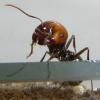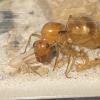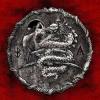Thank you for the information. I knew the colonies were infected with something, but I was thinking maybe bacteria or fungus, virus didn't even cross my mind. Obviously, whatever it is, it's detrimental to the health of the colony and is highly contagious. With this in mind, I quarantined the affected colonies as soon as I realized there was a problem. I have been washing and disinfecting my utensils before each feeding session and feeding the diseased colonies last. My sanitation practices are good because I had a problem with mites in the past and only use feeding trays once and then wash and disinfect them before reuse. I now disinfect my utensils between feeding each colony with hand sanitizer, from Covid days.
A test for viruses affecting ants will probably never be economically viable as ants are not that valuable and are kept by very few people. At this stage, even just a summary of common disease and pest problems, prevention, symptoms and cures or treatment would be useful. A discussion about sanitation practices would also be helpful.
At this point I have a few more questions. Do ants have an immune system; can they develop immunity to this infection or should I euthanize the affected colonies?
RPT
This is basically all you can do against infections in general (and viruses especially):
Hygiene, hygiene, and have I mentioned hygiene?
Best separate utensils for each colony, and if not possible, disinfect in between using them in different colonies.
In-out system.
Good sanitation.
Regular cleaning.
Do not let waste pile up.
Keep temperatures and humidity at optimum.
Feed the best quality foods.
Good luck!
Well, testing goes hand in hand with any diagnosis. And at our lab, we offer other tests for "random" pet species (amphibians, reptile species) and these tests are also not ordered very often. I have to hear what the other vets say and if it is in any way viable, I will do this.
I had to laugh.
"At this stage, even just a summary of common disease and pest problems, prevention, symptoms and cures or treatment would be useful. A discussion about sanitation practices would also be helpful. "
Well, YOU are the pioneer RIGHT NOW. YOU have sick colonies. YOU are now doing observations. YOU are needed to write down symptoms and any step YOU take.
Because, as I said, there is NO literature.
I am completely new to this, and I have no experience.
No vet has ever looked into this to my knowledge.
So I will be learning from YOU.
Take pictures.
Make plenty of notes.
If you take certain hygiene steps, and if there is any improvements, I rely on you to let me know.
I think you get the point....
It is not that simple. Vets are relying on ant keepers to actually teach them the ropes. As I am doing right now. So if you are willing to help out, we can maybe start a write-up on this (off into the rabbit hole.....).
But right now, common diseases are unknown. It is unknown how often certain bacteria, fungi, parasites and viruses affect pet ant colonies. It is unknown which pathogens these even are. With thousands of ant species, we are probably talking about hundreds of different viruses alone. Maybe these will never be discovered.
There are a few paper on viruses, but those are research papers, not a veterinary ones.
Since we do not know the pathogens, it is very hard to tell epidemiology and pathogenisis.
Symptoms have to be collected by the ant keepers who observe them and report them to the veterinary profession.
Treatment and prevention will have to be worked out from there.
Otherwise, any recommendations will be very general, like the ones I give above "clean your utensils and avoid feeding contaminated live foods".
This whole premise is daunting.
This will have to start at step one.
But at the same time, it is exiting.
This is an opportunity to do something completely new and fresh and stepping onto unexplored new lands.
As for the question with the immune system.
Like many invertebrates, insects only have an innate immune system, they lack the adaptive immune system which vertebrates have.
So they cannot form specific antibodies to fight specific new pathogens.
They rely on cytokines and phagocytic cells which target unspecific "foreign" pathogens.
So instead of the precision sniper rifle which the vertebrates are equipped with (B- and T- Lymphocytes and antibodies), insects basically shoot a broadside of unspecific grapeshot.
However, ants have a certain "secret weapon" which is the metapleural gland- this gland is one of the unique defining features of ants, and it produces antibiotics against bacteria and fungi.
But viruses?
Colonies infected with viruses might as well be doomed.
Ants also have a natural behaviour in that ants that are sick will leave the colony and stay away from their sisters. They basically isolate themselves. Which makes a lot of sense. See COVID.
Oh, and as for the first vaccine ever developed for insects (in this case, the honeybees) see this article:
https://www.smithson...here-180981400/
As you can see this vaccine does not trigger a adaptive immune reaction (no specific lymphocytes and antibodies) but relies on triggering the innate immune system of the larvae.
So for your question with euthanizing the colonies:
If you have the time, observe them and make notes on the symptoms and how many die how often and so on.
Pictures would be great, too.
This will be invaluable.
But of course this will take time and would be a little science project for a student at university all in itself, so do not feel obliged.
I studied diseases for my PhD (Avian Malaria in native New Zealand passerine birds) so I know it is A LOT of work.
If you see that the colonies are struggling and not thriving and numbers plummeting, you might have no other option than euthanasia.
It is just-
if nobody documents these issues and die-offs, how the heck should a lone vet like me, sitting at the yonder butt end of rural Germany, ever find out about it?
Edited by Ernteameise, August 9 2023 - 11:12 AM.
























